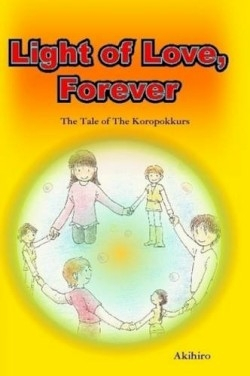It looks like you've stumbled upon a page meant to be read by our code instead of viewed directly. You're probably looking for this page.
Light of Love, Forever
The Tale of the Koropokkurs
The legendary Koropokkurs are a race of shy small and helpful people who appear repeatedly in Japanese folklore. Although the details of their disappearance differ from story to story most tales agree that they left our world after some type of confrontation with humans. Today the Koropokkurs also called Koro-pok-guru live on in popular culture most famously as the “minutians” in the manga series Shaman King. In this modern folktale Akihiro a farmer from Hokkaido a region in Japan where Koropokkurs were thought to live has updated their story with an environmental twist.
Three children Heiwa Ai and Yuuki (whose names mean “Peace” “Love” and “Courage” in Japanese) fall down a mountain and awake in a mysterious forest. They are discovered by three young Koropokkurs and the children bond with each other through music and movement. This story is written in a play format and each of the six chapters is a scene. The Koropokkurs have much to teach the children about gratitude and respect for the earth; the human children share their knowledge of music and exercise. These scenes lend themselves particularly well to the dramatic format as much of the way the Koropokkurs show respect to the Earth and one another is through movement. For example the Koropokkur equivalent of a handshake involves holding hands in a circle looking down up and at each other before offering an individual prayer.
Unfortunately the Koropokkurs live by a law that forbids human contact. When the friendship comes to the attention of the adults of the village the children must find a way to prove that the humans mean no harm. The adults have a dim view of humanity a people who have “lost connection with all living things” who “fight for money and their own personal gain.” In the ensuing discussion music again proves to be a bond and a particular melody provides a pleasing plot twist that provides for a satisfying conclusion to this tale.
Simple and delightful pen and ink drawings capture some of most dramatic scenes in the story adding emotion that is sometimes missing from the characters’ spoken lines.
There is some awkward phrasing possibly due to translation errors. For example the Koropokkurs “adorn simple clothing that is patched with tattered cloths.” A thirsty boy feels water as it “seeps deep inside me.” However choppy the text may be the basic intent of the author is clear and the music and movement incorporated into the play provide opportunities to liven up the dialogue and encourage thought about the role humans play as guardians of the earth.
By the time this story is concluded readers will agree with the Koropokkurs “Good or bad what humans do to others will always come back to affect them.” It’s a worthwhile message and one that children seem to grasp intuitively. Although this play is not a completely stage-ready script due to some stilted language the story is an intriguing one and the right group of children might find the start of a production between these pages.
Reviewed by
Carolyn Bailey
Disclosure: This article is not an endorsement, but a review. The publisher of this book provided free copies of the book and paid a small fee to have their book reviewed by a professional reviewer. Foreword Reviews and Clarion Reviews make no guarantee that the publisher will receive a positive review. Foreword Magazine, Inc. is disclosing this in accordance with the Federal Trade Commission’s 16 CFR, Part 255.
